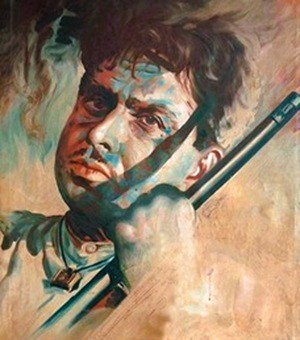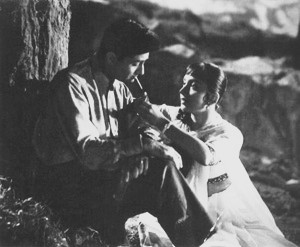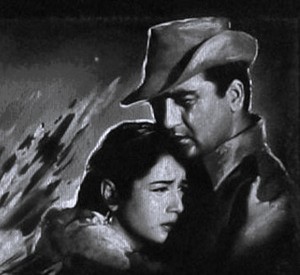Apr 15, 2025
Apr 15, 2025
The 1960s – Golden Years – Part 3
The Money Rakers (1960 - 1963) Continued
Gunga Jumna
 Gunga Jumna, directed by Nitin Bose was written and produced by Dilip Kumar, who played the leading role and ghost-directed and edited the film. Vyjayantimala shared the lead with Dilip Kumar and his brother Nasir Khan. Gunga Jumna tells the story of Ganga, a villager who becomes a dacoit after being falsely accused of theft, and his brother Jumna, who becomes a police officer. The film, in Technicolor, with dialogues in the Awadhi dialect, recreates the rural environment admirably. Music director Naushad composed songs with Avadhi lyrics. It was one of the most successful Indian films. Critics praised its story, screenplay, direction, cinematography, music, and the lead actors' performances. Lata Mangeshkar’s solos, Dhundo dhundo re sajna, Do hanson ka joda, Dagabaaz tori batiyan, and Jhanan ghunghar baje Mohammed Rafi’s Nain lad jaihe tho were mega hits along with Insaf ki dagar se, one of the few songs sung by Hemant Kumar for Naushad.
Gunga Jumna, directed by Nitin Bose was written and produced by Dilip Kumar, who played the leading role and ghost-directed and edited the film. Vyjayantimala shared the lead with Dilip Kumar and his brother Nasir Khan. Gunga Jumna tells the story of Ganga, a villager who becomes a dacoit after being falsely accused of theft, and his brother Jumna, who becomes a police officer. The film, in Technicolor, with dialogues in the Awadhi dialect, recreates the rural environment admirably. Music director Naushad composed songs with Avadhi lyrics. It was one of the most successful Indian films. Critics praised its story, screenplay, direction, cinematography, music, and the lead actors' performances. Lata Mangeshkar’s solos, Dhundo dhundo re sajna, Do hanson ka joda, Dagabaaz tori batiyan, and Jhanan ghunghar baje Mohammed Rafi’s Nain lad jaihe tho were mega hits along with Insaf ki dagar se, one of the few songs sung by Hemant Kumar for Naushad.
At the 9th Filmfare Awards, Ganga Jumna was nominated in seven categories including Best Film and Best Director. The film won Awards for Best Cinematography and Best Dialogues. Vyjayantimala won the Award for Best Actress. The film was adjudged the second-best feature film in Hindi at the 9th National Film Awards. Dilip Kumar’s performance won him the "Special Honour Diploma" as an actor from the Czechoslovak Academy of Arts, Prague.
Hum Dono
 Navketan films’ Hum Dono is a romantic drama, starring Dev Anand, in a double role for the first time, opposite Nanda and Sadhana. Amarjeet is credited as the film's director, but it was probably directed by Vijay Anand, who also wrote the screenplay and dialogues. It drew attention as a change from the romantic crime dramas Navketan had been churning out. Dev Anand curbed his mannerisms and showed for the first time his acting ability, to portray two markedly different personalities. The film is a sensitive depiction of life, love, insecurities about one’s physical appearance, and the impact of war. The director makes effective use of silences to convey emotions. The film is known for its music by Jaidev and Sahir Ludhiyanvi’s powerful lyrics. According to Javed Akhtar, the opening song, Abhi na jao chhodkar is one of the finest romantic duets ever made in Indian cinema. Main zindagi ka saath nibhata chala gaya and Kabhi khudpe kabhi halaat pe rona aaya are deeply philosophical. Allah tero naam ishwar tero naam is one of the best bhajans in films. The compositions, the vocals of Mohammed Rafi and Asha Bhosle, and Sahir Ludhiyanvi’s words come together beautifully to make each song a gem.
Navketan films’ Hum Dono is a romantic drama, starring Dev Anand, in a double role for the first time, opposite Nanda and Sadhana. Amarjeet is credited as the film's director, but it was probably directed by Vijay Anand, who also wrote the screenplay and dialogues. It drew attention as a change from the romantic crime dramas Navketan had been churning out. Dev Anand curbed his mannerisms and showed for the first time his acting ability, to portray two markedly different personalities. The film is a sensitive depiction of life, love, insecurities about one’s physical appearance, and the impact of war. The director makes effective use of silences to convey emotions. The film is known for its music by Jaidev and Sahir Ludhiyanvi’s powerful lyrics. According to Javed Akhtar, the opening song, Abhi na jao chhodkar is one of the finest romantic duets ever made in Indian cinema. Main zindagi ka saath nibhata chala gaya and Kabhi khudpe kabhi halaat pe rona aaya are deeply philosophical. Allah tero naam ishwar tero naam is one of the best bhajans in films. The compositions, the vocals of Mohammed Rafi and Asha Bhosle, and Sahir Ludhiyanvi’s words come together beautifully to make each song a gem.
Dev Anand had several more successful films during this period, namely Jab Pyar Kisi Se Hota Hai, Roop Ki Rani Choron Ka Raja, Baat Ek Raat Ki, Maya, and Asli Naqli. Nasir Hussain’s Jab Pyar Kisi Se Hota Hai was a musical romance that followed the pattern of Nasir Hussain’s earlier films with Dev Anand. Asha Parekh was his lady love in this film. Shankar Jaikishan scored music for Nasir Hussain for the first time and composed hit tunes, the title song Jab Pyar Kisi Se Hota Hai, and Teri zulfon se judaai toh nahin maangi thhi.
In HS Rawail’s Roop Ki Rani Choron Ka Raja, Dev Anand plays a thief as he did many times before and after. Despite the basic premise of a story involving a bunch of people travelling on a steamer, and their interactions, the poor script allows things to fizzle out inexplicably. Talat Mehmood and Lata Mangeshkar’s duet Tum toh dil ke taar chhedkar is memorable. Shankar Mukherjee’s Baat Ek Raat Ki is a crime mystery with a poor script, that failed to build suspense. The saving grace was the leading pair, particularly the utterly gorgeous Waheeda Rehman and the music of SD Burman. Two of the songs Akela hoon main is duniya mein, and Na tum humein jaano sung by Suman Kalyanpur, and Hemant Kumar became popular as did Manna Dey’s Kisne chilman se maara.
Released within a year of each other, DD Kashyap’s Maya, and LB Lachman’s Asli Naqli, had Dev Anand playing similar roles of a wealthy man living with the poor, opposite Mala Sinha and Sadhana respectively. Asli Naqli was more successful than Maya, mainly because of Hrishikesh Mukherjee’s direction. For Maya, Salil Chowdhury composed some memorable songs, Tasveer teri dil mein by Lata Mangeshkar and Mohammed Rafi, Jaa re, jaa re ud jaa re panchhi, by Lata Mangeshkar, Koi sone ka dilwala by Mohammed Rafi, and Ae dil kahan teri manzil by Dwijen Mukherjee. There were some good songs in Asli Naqli too, composed by Shankar Jaikishan, Kal ki daulat aaj ki khushian by Mohammed Rafi, Lakh chhupao chhup na sakega by Lata Mangeshkar, Tujhe jeevan ki dor se by Mohammed Rafi and Lata Mangeshkar and Tera mera pyaar amar by Lata Mangeshkar.
Hrishikesh Mukherjee directed three more films in this period, AVM’s Chhaya, LB Lachman’s Mem Didi and Aashiq produced by Bunny Reuben and Vijay Kishore Dube.
Chhaya
I was disappointed by Hrishikesh Mukherjee’s choice of theme for his next film after Anuradha. In AVM’s Chhaya there was no novelty in the plot or the characters for him to explore. It wouldn’t have mattered if the film had been directed by anyone else. Sunil Dutt and Asha Parekh act well but do not raise the quality of the film. The saving grace was Salil Choudhury's music and the singing by Talat Mehmood and Lata Mangeshkar. Itna na mujhse tu pyar badha, Aankhon mein masti sharab ki, and Aansoo samajh ke kyun mujhe continue to be my favourites. Chhaya is not one of Hrishikesh Mukherjee’s great films.
On the other hand, Mem-Didi is a heart-warming film, more like what I expected from Hrishikesh Mukherjee. It is a film about ordinary people, leading everyday lives. The basic plot involves a poor old woman toiling away to get her child through school. Lalita Pawar, shedding her stereotyped image of a scheming shrew, puts in a poignant performance as Mem Didi. Young Tanuja, as her foster child, and Kaysi Mehra, as Tanuja’s boyfriend provide a bubbly romance. The centerpiece of this film is the interplay between Mem Didi, and the two lovable rogues Bahadur and Sher Khan, played with great elan by David and Jayant respectively.
Aashiq was the only film produced by Bunny Reuben and Vijay Kishore Dube. Bunny Reuben was a film journalist best known for his biographies of Raj Kapoor, Mehboob Khan, and Pran. Vijay Kishore Dube was a well-known producer of music programmes on Radio Ceylon. Aashiq related the story of a lover of nature and music who finds his muse in a dancer, and neglects his wife and family in pursuit of his dream. The storyline and the development of other characters did not go well with viewers although the songs composed by Shankar Jaikishan remain in circulation till today. Mukesh’s solos Yeh tho kaho kaun ho tum, Tum jo hamare meet na hote, Main aashiq hoon baharon ka, Lata Mangeshkar’s solo Jhanan jhan jhanaake apni payal, and their duets O shama mujhe phoonk de and Mehtab tera chehra are still remembered by connoisseurs of Hindi film songs.
Bimal Roy, Hrishikesh Mukherjee’s guru, produced three films during this period. Kabuliwala and Usne Kaha Tha were based on well-known short stories. The third, Prem Patra, was a remake of the Bengali hit film Sagarika (1956). Bimal Roy directed only Prem Patra.
Kabuliwala
Bimal Roy produced Kabuliwala as a tribute to Gurudev Rabindranath Tagore in his centenary year. For the present generation, the word Kabuliwala may stand for the name of a movie, and for some, the title of a short story, but for our generation, the word evokes memories of tall bearded men in traditional Pathan dresses with big jholas hanging from their shoulders. They were seen in the bazaars, on the streets, and in railway colonies, hawking their wares, heeng (asafoetida) pista, badaam, munakka et al. Mothers instilled in their children fear of being carried away in their Jholas. They were money lenders who were reputed to be ruthless in demanding repayment. In Bhai Bhai, Kishore Kumar romanticised them in the song Mera naam abdul rehman, pista wala main hoon pathan.
In his short story Kabuliwala, which I read in school, Rabindranath Tagore humanized the community through the tender feelings of one of them for a Bengali child who reminded him of his own daughter. It was one of my favourite short stories. Soon after I arrived in Calcutta in 1957, I watched the Bengali version of Kabuliwala directed by Tapan Sinha, with Chhabi Biswas in the title role and Sharmila Tagore’s younger sister Tinku as the young girl Mini. I was very impressed with the acting of Chhabi Biswas. The simple story is faithfully rendered in the Bengali version. Tinku Tagore captured viewers’ hearts with her natural acting.
Directed by Hemen Gupta, Bimal Roy’s Kabuliwala starred Balraj Sahni as the Kabuliwala, Sonu as Mini, and Sajjan as her father. It was inevitable that I would compare Bimal Roy’s Hindi version of the story, with the Bengali version. Several additions made to the original story in the Hindi version did not enhance the value of the film. They increased its length and acted as a drag on the narration. Unlike the Bengali film, Bimal Roy’s film did not win national or international awards, but it is remembered for Balraj Sahni's moving portrayal of the Pathan. Sonu is believable as Mini, and Sajjan is perfect as her father, quiet, and sensitive, yet with a sense of humour. Salil Chowdhary’s compositions, Ai mere pyare watan sung by Manna Dey, and Ganga aaye kahan se sung by Hemant Kumar are memorable.
Usne Kaha Tha
 Usne Kaha Tha is a classic Hindi short story by Chandradhar Sharma Guleri. I read it in school and some of the passages have stayed with me all these years. Set in the time of World War I, the story begins with a description of how, unlike in other towns, tonga drivers in Amritsar warn pedestrians politely to get them out of their way without using gender-based abusive words. bacho khalsaji (careful sir), hato bhaiji (aside brother), hato baachha (aside child), etc. and the more persuasive hat jeene jogiye (aside, one capable of living long), hat ja karman waliye (aside, fortunate one), hat ja puttaan pyariye (aside, beloved of your children), bach ja lambi valiye (aside, the one with a long life) for the stubborn.
Usne Kaha Tha is a classic Hindi short story by Chandradhar Sharma Guleri. I read it in school and some of the passages have stayed with me all these years. Set in the time of World War I, the story begins with a description of how, unlike in other towns, tonga drivers in Amritsar warn pedestrians politely to get them out of their way without using gender-based abusive words. bacho khalsaji (careful sir), hato bhaiji (aside brother), hato baachha (aside child), etc. and the more persuasive hat jeene jogiye (aside, one capable of living long), hat ja karman waliye (aside, fortunate one), hat ja puttaan pyariye (aside, beloved of your children), bach ja lambi valiye (aside, the one with a long life) for the stubborn.
Two Sikh teenagers meet frequently in the bazaar. Each time the boy asks the girl Teri kudmayi ho gayee? (Are you engaged?) and she replies dhat and runs away until one day she replies unexpectedly haan (yes), points out her new silk stole, and runs away. The boy goes home venting his unexplainable frustration on the people on the street. Twenty-five years go by. The boy, now a soldier in the Sikh Regiment of the British Indian Army, is on furlough, the girl almost forgotten. He is summoned by his superior NGO to report for duty at the latter’s residence. They have been called up to the front. There he meets the boss’s wife who turns out to be the same girl. She reminds him of the old days and makes him promise that he will protect her husband and her only son, who is in the same regiment. In the trenches on the German front, the protagonist sacrifices his life to protect the father and son because,…. Usne kaha tha (she had said).
The writing is critically acclaimed for the "perfection of technique, characterization, and effect". Subtlety is a hallmark of the story. There are no missives between lovers, no secret meetings, no romps in parks, and no mutual exchange of vows. Readers infer the bond between the protagonists from the boy’s anger at her engagement, staying unmarried, and his eventual sacrifice. The girl’s feelings are revealed by her recalling her association with him and entrusting him with the safety of her husband and son.
The screenplay by S Khalil and Bhanu Pratap relates the story like a formula romantic film. Poor boy meets rich girl, they romance and exchange vows, but the girl’s father rejects her lover and he joins the army in frustration. Good direction by Moni Bhattacharjee and good performances by Sunil Dutt, debutant Indrani Mukherjee and Tarun Bose raise the level of the film above average. Salil Chowdhary’s music was an added asset. Manna Dey’s Jane wale sipahi se poochho written by Makhdoom Mohiuddin, Talat Mehmood, and Lata Mangeshkar duet Aha rimjhim ke tarane leke and Lata Mangeshkar solo Machalti aarzoo khadi bahen pasare were hits. All in all, what could have been a great film ended up being just a good film.
01-Feb-2025
More by : Ramarao Annavarapu

|
Great memories ! |